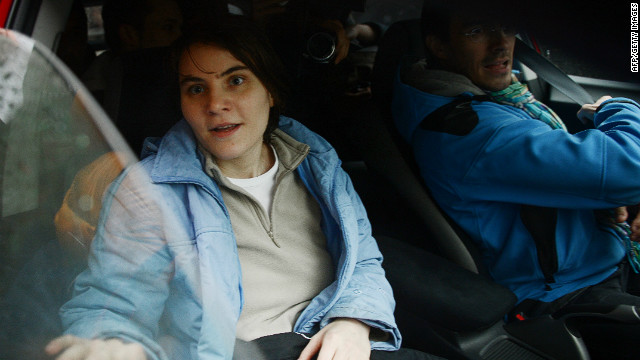
- Yekaterina Samutsevich was stopped by a guard from joining in the protest song
- Amnesty International says the ruling is "only a half-measure in achieving justice"
- The court upheld 2-year sentences for Nadezhda Tolokonnikova and Maria Alyokhina
- The sentence is linked to their performance of a song critical of President Vladimir Putin
Moscow (CNN) -- A Moscow court upheld two-year prison terms for two Pussy Riot band members but ordered a third freed with a suspended sentence Wednesday.
The Russian punk band members were sentenced in August for performing a song critical of President Vladimir Putin in one of the Russian Orthodox Church's most important cathedrals in February.
Yekaterina Samutsevich was expected to walk out of the court building Wednesday. The court upheld the sentences for Nadezhda Tolokonnikova and Maria Alyokhina.
Although Samutsevich is a member of Pussy Riot and was involved in planning the protest act, she was stopped by a guard on her way into the church and so did not perform the "punk prayer" song, the court heard.
Supporters responded joyfully in the courtroom as her release was announced.
The decision came only a week after Samutsevich took on a new legal team for the appeal, saying she wanted to push her defense in a different direction.
Video footage of the flash mob-style act showed that Samutsevich was not one of the four women who took part in the protest.
Her lawyer argued that as she was not technically part of the performance, she should not be punished in the same way as Tolokonnikova and Alyokhina.
The three women, who were arrested shortly after the protest act, were convicted and sentenced for hooliganism. Two other members of the female punk rock band have fled Russia.
Both Tolokonnikova and Alyokhina, who have been in custody for more than six months, are expected to serve the remainder of their prison terms in different prisons. Each of them has a young child.
Speaking outside court, lawyers for the two women said they would try to take their case to the European Court of Human Rights.
Rights group Amnesty International said Wednesday's ruling was "only a half-measure in achieving justice" for the women, and called for all three to be released immediately and unconditionally.
"Any decision that shortens the wrongful detention of the three women is welcome. But no one should be fooled -- justice has not been done today," David Diaz-Jogeix, Amnesty's Europe and Central Asia deputy program director, said in a statement.
"The government has introduced numerous new restrictions to freedom of expression in recent months. As this decision demonstrates, Russia's judiciary is unlikely to offer much protection to those who fall foul of them."
The band's conviction and sentencing garnered an international outcry, with celebrities from Paul McCartney to Anthony Bourdain to Madonna backing the cause of the strident trio.
"Say what you will about Pussy Riot: this might not be your kind of music. Their actions might offend you. But this doesn't change the fact that freedom of expression, in whatever peaceful form it takes, is a human right, and one on which the protection of other rights rests," wrote Michelle Ringuette of Amnesty International USA.
The February incident outraged many of the country's faithful.
Footage of the brief but provocative protest action, in which the band members, clad in balaclavas, screamed "Mother Mary, please drive Putin away" inside Christ Savior Cathedral attracted wide attention after it was posted online.
A judge rejected the women's defense that their actions were politically motivated, ruling that they had intended to insult the Orthodox Church and undermine public order.
An Orthodox Church leader has been widely reported as saying Putin's years in power have been a miracle from God.
Before the hearing last week, the Russian Orthodox Church appealed for leniency for the band members, according to state-owned Ria Novosti.
The church believes repentance will "benefit the souls" of the band members, the news agency said.
Russian Prime Minister Dmitry Medvedev has called for the members' release but also said he is "sickened" by their actions.
CNN's Alla Eshchenko and Alexander Felton contributed to this report.


